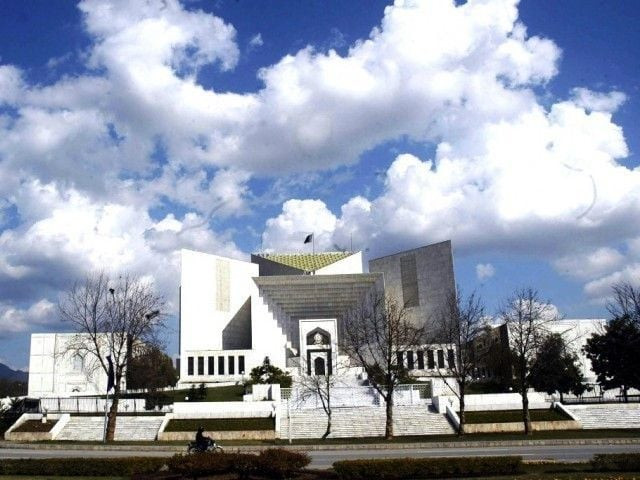New SC bench to hear media’s ‘harassment’ case
Court will examine grievances of applicants on touchstone of Article 184(3)

Acting Chief Justice of Pakistan Umar Ata Bandial on Friday formed a three-member bench, comprising Justice Ijazul Ahsan, Justice Munib Akhter and Justice Qazi Muhammad Amin Ahmed to hear the journalists’ “harassment” case.
The bench will examine the grievances of the applicants on the touchstone of Article 184(3) of the Constitution – which deals with question of public importance with reference to the enforcement of any of the fundamental rights – and the entitlement of the applicants to any relief thereunder.
The acting chief justice noted that “journalists render valuable service to the people in keeping them abreast with events and informed opinion”, adding that their work enjoyed the protection of Article 18, Article 19 and Article 19(A) of the Constitution.
“The violation of rights guaranteed by the said articles, prima facie, raises questions of public importance, attracting the constitutional jurisdiction of the Supreme Court under Article 184(3) of the Constitution,” he observed.
The matter has been fixed for hearing on Monday.
Earlier this week, a Supreme Court larger bench headed by Justice Bandial, had recalled its two-member order regarding harassment of media persons by state institutions.
The court also held that CJP was the “sole authority by and through whom the suo motu jurisdiction can be, and is to be, invoked/assumed” under Article 184 (3) of the Constitution”.
A division bench of the apex court comprising Justice Qazi Faez Isa and Justice Jamal Khan Mandokhail on August 20, directly entertained the Press Association of Supreme Court’s (PAS) application against harassment of media personnel by state agencies.
Also read: Only CJP can take suo motu notice, rules SC
The division bench also summoned several government functionaries on August 26 before it. Interestingly, both the judges belong to the province of Balochistan.
On August 23, a five-judge larger bench of the apex court, headed by the acting CJP and comprising Justice Ijaz ul Ahsan, Justice Munib Akhtar, Justice Qazi Muhammad Amin Ahmed and Justice Muhammad Ali Mazhar, “held in abeyance” the two-member bench order as it “deviated from established practice of entertaining suo motu notice”.
The larger bench also posed a question of whether the suo motu jurisdiction could be invoked under Article 184 (3) of the Constitution. Notices were also issued to attorney general for Pakistan, Supreme Court Bar Association president and Pakistan Bar Council vice chairman for legal assistance. However, the bench ignored their contentions.
The larger bench while announcing the order said for detailed reasons to be recorded later and subject to what is set out therein by way of amplification or otherwise: it is declared that the invocation/assumption of the suo motu jurisdiction of this court under Article 184(3) of the Constitution is based on, and shall be guided by, the following principles.
Firstly, the court declared that the CJP was the sole authority by and through whom the said jurisdiction could be, and was to be, invoked/ assumed.
Secondly, the CJP may invoke/assume the said jurisdiction in his discretion and shall do so if so requested or recommended by a bench of the court.
Thirdly, it said: "No bench may take any step or make any order (whether in any pending proceedings or otherwise) as would or could constitute exercise of the suo motu jurisdiction (such as, but not limited to, the issuance of any notice, making any enquiry or summoning any person or authority or any report) unless and until the Chief Justice has invoked/assumed the said jurisdiction."
The order also said that all matters already pending in respect of, or involving, the suo motu jurisdiction of the court shall continue to be heard and disposed of by such benches as are constituted from time to time by the chief justice. The larger bench also held that the August 20 order stood recalled.



















COMMENTS
Comments are moderated and generally will be posted if they are on-topic and not abusive.
For more information, please see our Comments FAQ